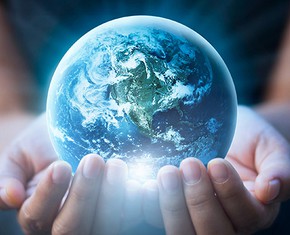The views expressed in our content reflect individual perspectives and do not represent the authoritative views of the Baha'i Faith.
“You Baha’is,” a famous American author once derisively told me, “when will you give up on this unity thing and realize that conflict and violence between humans will never end?”
He had a point—a grim, dark, pessimistic one, yes, but a seemingly rational one. Anyone with a middling knowledge of recorded human history knows that our past ain’t pretty. If you rated the prospects for a peaceful, harmonious future by gauging humanity’s past history, things wouldn’t seem very promising. Every spot on Earth, the Baha’i teachings themselves admit, once ran red:
History is a record of incessant wars. There is not a spot on the globe that has not been crimsoned with the blood of men; the whole earth is blood-drenched. – Abdu’l-Baha, Divine Philosophy, pp. 60-61.
All across our blood-drenched planet, we humans have fought and killed one another for millennia. We’ve constantly managed to develop seemingly unresolvable conflicts, where tribalized groups pitted against one another couldn’t resolve their differences, and where those entrenched differences ultimately led to bloodshed, slaughter and genocide.
In many places today, these kinds of intractable human conflicts persist. Whether at the verbal stage or actively violent, we haven’t yet reached a solution. Recent research shows that the American nation, as just one example, has now become more politically polarized than at any time since the Civil War. Several of those studies show that the moderate middle—once a dominant group in American social and political life—has dwindled dramatically.

In Israel and Palestine, another as-yet-intractable divide between peoples has resisted resolution for more than half a century. So entrenched that it now has a name, the Israeli-Palestinian Conflict initially arose from late 19th and early 20th century Jewish and Arab nationalist movements, each determined to gain sovereignty for their people in the Middle East.
Those two well-known examples of persistent conflicts lead the list of many, many others around the world—the ongoing warfare in Central Africa, the unresolved disputes between Muslims and Buddhists in Southeast Asia, the ethnic hatred that still persists in the Balkans, the revolts against oppression in Latin America, outbreaks of terrorism just about everywhere, etc., etc.
So, with an eye toward understanding the root causes and the potential solutions of these conflicts, scientists have begun to study them, attempting to glean some knowledge about how they start and sustain themselves over time. In each instance, the research predictably finds a large measure of mutual distrust between groups, which generates deep divisions over basic issues. When that distrust solidifies in the consciousness of any group, it inevitably generates hostility and conflict.
In politically-polarized societies like the United States, and in war- and conflict-ridden regions like the Middle East, the research also shows that each side tends to have enormous amounts of reciprocal skepticism about the other side’s fundamental motives. That divergence, which science has begun calling “Motive Attribution Asymmetry” (MAA), means any given side in a conflict believes the other side’s motivation comes from hatred, but that its own motives come from love.
This question of motives goes right to the heart of all conflicts between people. In each one of those conflicts, in-groups and out-groups do battle, whether ideologically or with weapons. According to one extensive study, published in the Proceedings of the National Academy of Sciences, each side invariably tends to see their own actions as ultimately loving, and the other side’s actions as hateful:
Five studies across cultures involving 661 American Democrats and Republicans, 995 Israelis, and 1,266 Palestinians provide previously unidentified evidence of a fundamental bias, what we term the “motive attribution asymmetry,” driving seemingly intractable human conflict. These studies show that in political and ethnoreligious intergroup conflict, adversaries tend to attribute their own group’s aggression to ingroup love more than outgroup hate and to attribute their outgroup’s aggression to outgroup hate more than ingroup love. – Motive attribution asymmetry for love vs. hate drives intractable conflict
Scientists know this phenomena as “attributional bias.” We tend to see our own motives as good, and we attribute the motives of those who oppose us to something bad. Attributional bias—which is really just another form of prejudice—makes conflicts much harder to resolve. How can we overcome that bias? The wide-ranging Princeton study concluded that: “… recognizing this attributional bias and how to reduce it can contribute to reducing human conflict on a global scale.” – Ibid.
First, then, we must recognize attributional bias in ourselves, and then set about reducing it. The Baha’i teachings have some clear recommendations for doing exactly that:
Man must be just. We must set aside bias and prejudice. We must abandon the imitations of ancestors and forefathers. We ourselves must investigate reality and be fair in judgment. – Abdu’l-Baha, The Promulgation of Universal Peace, p. 346.
Leaders of governments and all in authority would be well served in their efforts to solve problems if they would first seek to identify the principles involved and then be guided by them.
The primary question to be resolved is how the present world, with its entrenched pattern of conflict, can change to a world in which harmony and co-operation will prevail. – The Universal House of Justice, The Promise of World Peace, pp. 3-4.
The enduring legacy of the twentieth century is that it compelled the peoples of the world to begin seeing themselves as the members of a single human race, and the earth as that race’s common homeland. Despite the continuing conflict and violence that darken the horizon, prejudices that once seemed inherent in the nature of the human species are everywhere giving way. Down with them come barriers that long divided the family of man into a Babel of incoherent identities of cultural, ethnic or national origin. That so fundamental a change could occur in so brief a period—virtually overnight in the perspective of historical time—suggests the magnitude of the possibilities for the future. – The Universal House of Justice, To the World’s Religious Leaders, p. 1.
You May Also Like
Comments

















https://www.sciencedirect.com/science/article/pii/S1364661318302602. It turns out that I am neither wrong nor crazy! I am trying to ...watch and listen to the news with an open mind. However, the mainstream news is, for the most part, not aware of the Baha'i teachings.